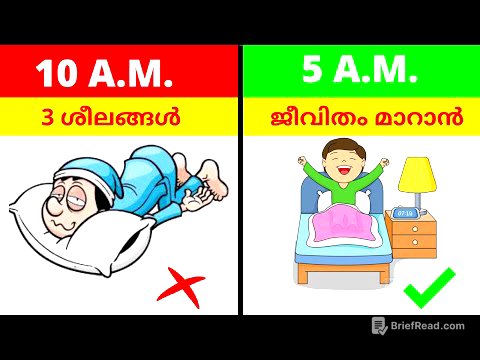TLDR;
This YouTube video by Ocean English Academy provides a comprehensive guide to improving spoken English, focusing on practical phrases, common mistakes, and effective communication techniques. The video uses real-life scenarios and examples to illustrate key concepts, making it easier for viewers to understand and apply the lessons. It covers a wide range of topics, from overcoming fear of speaking to mastering everyday English expressions.
- Overcoming fear and translation habits when speaking English.
- Learning practical English sentences and phrases for various situations.
- Avoiding common grammatical errors and improving pronunciation.
How not to freeze while speaking English? [0:00]
The video addresses the common issue of freezing up while speaking English, explaining that it often stems from trying to translate directly from one's native language instead of thinking in English. The speaker emphasizes the importance of reading and speaking English regularly to build confidence and fluency. Samantha's story illustrates how the pressure to translate perfectly can lead to anxiety and hinder communication. The key is to focus on understanding English as a separate language with its own expressions and ways of speaking.
How to translate sentences perfectly [3:14]
The discussion highlights that direct word-for-word translation from Hindi to English often leads to awkward or incorrect sentences. It's essential to understand that English has its own unique expressions and sentence structures. Instead of translating, one should try to simplify the Hindi sentence and then find the appropriate English equivalent. For example, instead of directly translating "koi peeche se aaya tha," a better approach is to think of it as "Did someone come in my absence?"
I am on it [5:14]
This segment explains the meaning and usage of the phrase "I am on it." It indicates that one has started working on a task and is in the process of completing it. For instance, if someone is asked to complete a task, responding with "I am on it" conveys that the work has commenced and is underway. The speaker advises against getting stuck on direct translations and encourages exploring English phrases to improve fluency.
Don't take him at his words [6:52]
The segment explains the meaning of "Don't take him at his words" which means not to believe everything someone says. The speaker advises against blindly trusting someone's statements and encourages critical thinking. The speaker highlights that constant exposure to such sentences helps them naturally come to mind during conversations.
How to avoid a Tongue-tied situation [7:53]
This portion of the video discusses how to handle situations where one becomes tongue-tied while speaking English. The phrase "tongue-tied" is explained, and the speaker offers "cat got your tongue" and "tongue-tied" as alternative expressions. The speaker encourages viewers to share their experiences and emphasizes that consistent learning and exposure to the language can help overcome this issue.
When to use 'Power Nap' in a sentence [10:06]
The speaker explains the meaning of "power nap" and how to use it in a sentence. A power nap is a short rest taken in the afternoon. The speaker uses examples to illustrate how to incorporate "power nap" into everyday conversations, encouraging viewers to use the phrase in their daily routines.
Asking for a spelling [10:55]
This segment provides phrases for asking someone to spell a word. The speaker suggests using phrases like "How do you spell it?" or "Could you spell that for me, please?" These phrases are useful in situations where you are unsure of the spelling of a word someone has used.
Asking to speak up [11:40]
The video offers polite ways to ask someone to speak louder, such as "Could you speak up, please?" This is particularly useful in situations where you are having difficulty hearing or understanding the other person. The speaker also provides alternative phrases for different contexts, such as asking someone to speak nicely or gently.
What to use fell down or fell from? [12:27]
The speaker clarifies the difference between "fell down" and "fell from." "Fell down" is used when someone falls on the same level, like "I fell down the stairs." "Fell from" is used when someone falls from a height or a distance. The speaker uses examples to illustrate the correct usage of each phrase.
Don't tell it to anyone [13:44]
This segment explains the meaning of "Don't tell it to anyone," which is a request to keep something confidential. The speaker emphasizes the importance of understanding the context in which the phrase is used.
Is it noticeable? [14:09]
The speaker explains how to ask if something is noticeable, using the phrase "Is it noticeable?" or "Is this noticeable?". The speaker provides examples, such as asking if a stain on clothing is visible. The segment emphasizes the importance of using correct sentence structures to avoid confusion.
Don't speak in between [15:07]
This segment explains the meaning of "Don't speak in between," which is a polite way to ask someone not to interrupt. The speaker provides alternative phrases and emphasizes the importance of using polite language in conversations.
Use of Worn out [15:35]
The speaker explains the meaning of "worn out," which describes something that is damaged or unusable due to excessive use. The speaker uses the example of worn-out shoes to illustrate the meaning.
Use of the word Picky [16:08]
This segment explains the meaning of "picky," which describes someone who is very selective or fussy, especially about food or clothes. The speaker uses examples to illustrate how to use "picky" in a sentence.
Use of the word Selective/Choosy [17:02]
The speaker explains the meaning of "selective" and "choosy," which are similar to "picky" but can be used in a broader context. These words describe someone who is careful and deliberate in their choices.
Use of the word Behind [17:51]
This segment briefly touches on the usage of the word "behind," likely in the context of spatial relationships or being the cause of something.
Be careful [18:04]
This segment briefly introduces the phrase "Be careful" as a general warning.
Use of Watch Out [18:07]
The speaker explains the meaning of "watch out," which is a warning to be careful. The speaker provides examples, such as "Watch out for the step" or "Watch out for your head," to illustrate how to use the phrase in different situations.
I have no time to argue with you [19:04]
This segment explains the meaning of "I have no time to argue with you," which is a way to express that you do not want to engage in a debate or disagreement. The speaker provides the word "argue" as the key to the meaning.
Use of the word Allover [19:21]
The speaker explains the meaning of "all over," which means completely or everywhere. The speaker uses the example of mosquito bites all over the hand to illustrate the meaning.
Use of Must [19:56]
This segment explains the use of "must," which indicates something that is essential or necessary. The speaker uses the example of "You must consult a doctor" to illustrate the meaning.
Use of Suppose [20:13]
The speaker explains that "suppose" can be used as a substitute for "think." For example, "I suppose you know him" is similar to "I think you know him."
Do you happen to know? [20:42]
This segment introduces the phrase "Do you happen to know?" as a more advanced way of asking "Do you know?". The speaker emphasizes the importance of practicing the phrase until it becomes natural.
Fickle minded [21:37]
The speaker explains the meaning of "fickle-minded," which describes someone who is indecisive or constantly changing their mind. The speaker uses examples to illustrate how to use the phrase in a sentence.
Much Vs More [22:13]
This segment discusses the difference between "much" and "more." The speaker explains that "much" is used with uncountable nouns, while "more" is used for comparison.
Jot down use [23:00]
The speaker introduces the phrase "jot down," which means to write something quickly. The speaker uses the example of "Jot down my number" to illustrate the meaning.
I would love to do [23:36]
This segment explains the use of "I would love to," which is a polite way of expressing willingness or enthusiasm. The speaker uses examples to illustrate how to use the phrase in different situations.
How to politely say No [24:20]
The speaker provides polite ways to decline a request or invitation. The speaker suggests using phrases like "I would love to help, but unfortunately, I can't" or "I'm preoccupied with something else."
Alternatives for Definitely [25:58]
This segment offers alternatives for the word "definitely," such as "for sure" or "absolutely." The speaker emphasizes that using these alternatives can make your English sound more natural and varied.
Drop him a text [26:40]
The speaker explains the meaning of "drop him a text," which means to send someone a message. The speaker emphasizes that this is a modern English expression commonly used in web series and everyday conversations.
Learn to say one thing in multiple ways [27:09]
This segment emphasizes the importance of learning to express the same idea in multiple ways. The speaker uses the example of "Leave early tomorrow morning to avoid traffic" and provides alternative ways of saying the same thing.
How to pronounce The according to context [28:13]
The speaker explains how to pronounce "the" differently depending on the following word. If the following word starts with a vowel sound, "the" is pronounced as "thee." If the following word starts with a consonant sound, "the" is pronounced as "thuh."
Check it out! [29:13]
This segment explains the meaning of "check it out," which means to look at something. The speaker uses examples to illustrate how to use the phrase in different situations, such as showing someone a new drawing or a beautiful view.
Quite True! [29:45]
The speaker introduces the phrase "quite true" as an alternative to "absolutely correct." This phrase is used to express agreement with someone's statement.
Asking for a discount [29:58]
This segment provides phrases for asking for a discount, such as "Please make it a thousand." The speaker emphasizes the importance of using polite language when asking for a discount.
Talking about budget [30:47]
The speaker provides phrases for expressing that something is too expensive, such as "This is very much out of my budget." The speaker explains that "way" is used as an intensifier in this context.
Use of Tied Up [31:43]
The speaker explains the meaning of "tied up," which means busy or occupied. The speaker uses the example of "I am tied up in a meeting" to illustrate the meaning.
Throw it out [32:46]
This segment briefly mentions the phrase "throw it out," likely in the context of discarding something unwanted.
Agreeing with someone [32:52]
The speaker provides phrases for expressing agreement with someone, such as "I completely agree" or "I cannot agree enough." The speaker emphasizes the importance of using correct grammar when expressing agreement.
Use of Pick up [33:31]
The speaker explains the meaning of "pick up," which can mean to collect someone or something. The speaker uses the example of "I would have picked you up" to illustrate the meaning.
Use of Revert [34:28]
The speaker explains the meaning of "revert," which means to reply or get back to someone. The speaker uses the example of "I will revert in a week or two" to illustrate the meaning.
Use of Mislead [35:11]
The speaker explains the meaning of "mislead," which means to give someone the wrong information. The speaker emphasizes the importance of not misleading people and telling the truth.
Use of Anything Else [35:35]
The speaker explains how to ask if someone wants anything else, using the phrase "Anything else?". The speaker provides examples to illustrate how to use the phrase in different situations.
Use of The Heck [36:10]
The speaker explains how to use "the heck" to express anger or frustration. The speaker uses the example of "What the heck are you doing with my laptop?" to illustrate the meaning.
It is in the pipeline [36:48]
The speaker explains the meaning of "in the pipeline," which means in process or underway. The speaker uses the example of a project in the pipeline to illustrate the meaning.









